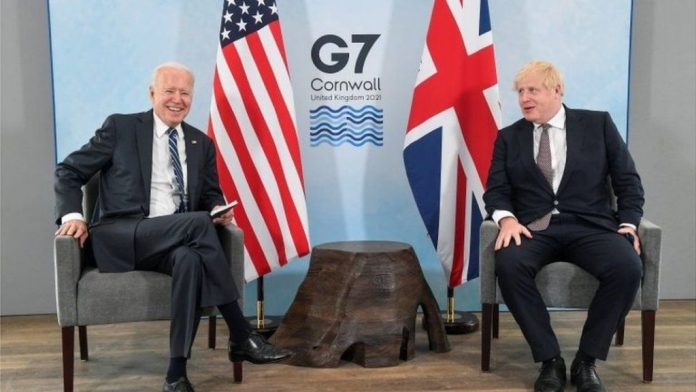The G7 meeting has illustrated rare unity among the seven leaders that attended in discussing global challenges. For many years the world’s leading democratic economies have gotten used to the rise of authoritarianism and chaos in their camp. Last year the US showed little interest in working with European allies to figure out a joint strategy against the pandemic. Now the US is listening again and US President Joe Biden is saying that western democracies can lead in the face of global challenges.
For some this is just talk and the reality is that China, Iran, Russia, Turkey and other authoritarians are humiliating Biden, Europe and US allies and partners. But BBC says the “seven leaders are to commit to using all their resources in an effort to ensure the devastation caused by a pandemic like Covid-19 is never repeated.” A declaration is supposed to be issued at Carbis Bay in the pretty Cornwall seaside where the events are taking place. “The aim is to slash the time needed to develop vaccines to under 100 days,” reports say.
Newly married UK Prime Minister Boris Johnson is hosting the other leaders. They will meet the Queen and they have been doing shoulder-bumps to greet each other rather than handshakes.
Two EU leaders are present as well, alongside the US, UK, Italy, Japan, Germany, France and Canada. Japan is the only Asian country that is a member. Ursula von der Leyen, the EU Commission president is one of the two EU leaders who came. She was infamously denied a chair at a meeting with Turkey’s authoritarian president in April. At the G7 she will be treated with more respect, alongside her EU colleague Charles Michael.
After 18 months of pandemic the leaders say they want to learn the lessons of the past. In the US there is growing interest in the possibility that the pandemic began as a “lab leak.” US President Joe Biden has said that the event shows that “diplomacy is back.” This is an important foreign trip for him and is supposed to include a meeting with Russian President Vladimir Putin in Geneva. Biden may also meet Turkey’s leader Recep Tayyip Erdogan, who has often threatened the US and US allies and partners and who is acquiring Russia’s S-400 system. All eyes will be on Biden for how he handles these meetings.
Reports say the G7 illustrates the importance of in-person diplomacy, largely absent during the pandemic. However, there are many questions the meetings raise. The G7 is largely a western democracy club. These are powerful economies but there are questions about their unity of purpose. Germany has appeared soft on Russia and Turkey and other authoritarians. The UK, having left the EU, often puts trade above human rights and principles. France is seeking to draw down its role fighting Islamist extremists in the Sahel while the US is leaving Afghanistan.
It is unclear whether these countries can coordinate better joint responses to various crises from Ukraine to Syria and the Sahel. In general the last decade has witnessed a rapid erosion of democracies being willing to intervene to push for human rights or even bolster countries being threatened by terror groups. Meanwhile the authoritarians appear to be winning, blocking social media and undermining elections.
This has implications for the Middle East because a strong state system has re-emerged after years of chaos. That requires more support for peace processes in Libya, Yemen and Syria, as well as between Israel and the Palestinians. But disparate policies means that different groups don’t know what to expect. Russia wants to play a role in Yemen and Libya, building on its role in Syria. China condemned the US during the recent Gaza conflict. That means that while the G7 may have a nice photo op, it has to follow through with more actual work after. / jpost














